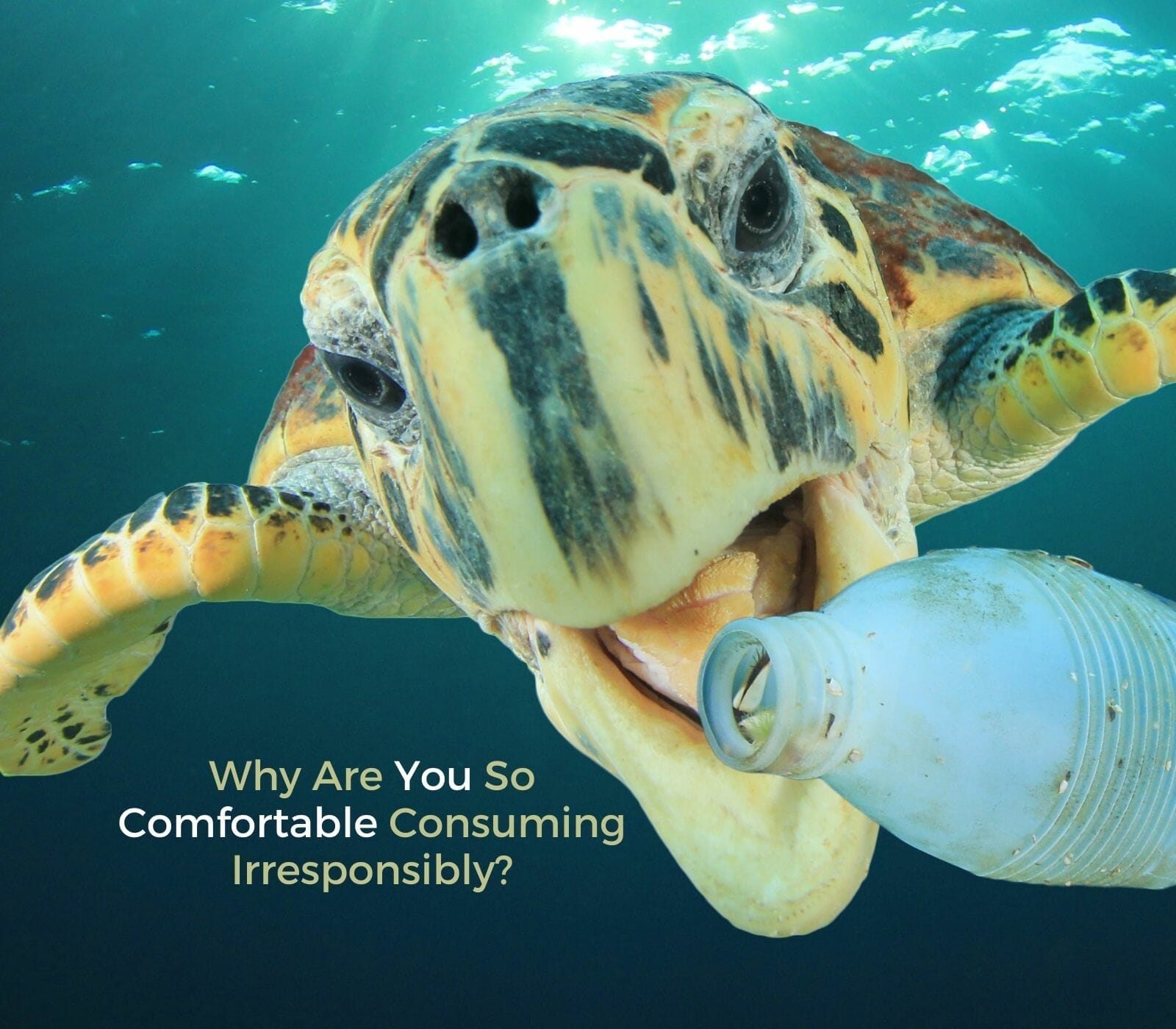Why Are You So Comfortable Consuming Irresponsibly?

It is easy to blame Industry for the destruction of our environment, but it is our consuming habits, like the use of single-use plastic bags, that are driving Industry.
Conscious Consumer: Why Are You So Comfortable Consuming Irresponsibly?
by Alberto Adler
Although we have used the responsibility for a possible traffic accident as an example for the consumption awareness process (on our Previous article from the Series: Conscious Consumer); there is a crucial difference between the situations. While a serious traffic accident is a situation whose immediate consequences are apparent and easily associated with its causing event, the consequences of irresponsible consumption habits are diluted among millions of small daily gestures of millions of people (billions, even).
While unintentionally crossing three lanes of a highway can cause a horrible accident, with noise and interdiction of traffic, our daily consumption habits silently wreak havoc but with a tremendous everlasting, and devastating effect.
The problem, therefore, is one of perception. In the example of traffic accidents, we see the consequences – which helps to be preventive. We never see dolphins being killed so that we have tuna in our sandwich, or we see soil contamination when we dispose of used batteries without proper care. As the consequences are “invisible,” we tend to adopt more careless postures.
And, to complement this careless negligence of not seeing the consequences comes the question that it is easy to shift the blame and assign culpability to large corporations. It is especially true when we identify them generically – it’s easier to buy a car from a particular maker when, while we criticize fossil fuel engine pollution, we don’t designate their manufacturers by names like Volkswagen or Ford.
Instead, we speak of an abstract entity called the “Automobile Industry” (a title that would include Tesla, which only makes cars with electric motors). Thus, we dissociate ourselves from the problem with the false impression that we are not involved.
But if the fishing company passes a net that destroys the bottom of the sea and we continue to buy their fish (seafood products), ultimately, we are, at the very least, their accomplices. And it is not enough to buy the fish.
Take the case of Mitsubishi. You may not even buy the fish they catch with environmentally aggressive methods (as shown in the documentary Seaspiracy). But, if you buy the branded pens or a car, you continue to support them, indirectly.
Large corporations have already learned that we consumers tend to accuse large conglomerates of villainy as a way to indulge ourselves.
Their support comes, in part, from dichotomous reasoning – in which the culprit is the one who commits what is seen as an atrocity, but whoever buys the product of this reprehensible and condemned method does not. The conglomerates themselves avoid involving end consumers in discussions about liability.
Instead, to protect their brands, they call for resources such as:
• Fantasy brands: brands that exist only to bear the brunt of questionable activities, sparing the leading brands of large corporations.
• Green Washing: a communicational makeup that crosses with ecologically correct behaviors that are the opposite.
• “Smother” operations that consist of, roughly speaking, applying various methods (ranging from investments, or divestments, in media and press and public relations services, to more drastic resources) to silence the media’s mouth on uncomfortable subjects.
• Disinformation: covers several subterfuges, from “organic product” or “Dolphin Free” stamps, whose sources are the self-declaration of the producers; pseudoscientific (or scientific studies produced with bias and other purposeful method flaws); statements from experts and celebrities who can sell information; fake news, etc.
All these strategies have the ultimate goal of making the end consumer feel less guilty or even free of any blame and continue to consume their products. That’s why I call these features “Comfort Communications.”
The consumer, feeling comfortable with himself, since the information he receives gives him the tranquility of a clear conscience, maintains his consumption habits, and starts to consider the warnings to the contrary as part of some hysteria or political conspiracy.
Much of the battle for conscious consumption takes place in the realm of communications, but few people even notice this. Another important element worth mentioning is the difference in frequency of the actions. That is what makes the difference between making sure that thoughtless, untimely, or just deliberately careless attitudes can harm both yourself, and others can be the first step toward more measured attitudes.
Yes, but not necessarily!
There are even those who say, “Damn, I caused a serious accident, but luckily I’m fine. What luck. The bad luck of those who came after me!”.
This is an example of a selfish and self-reference mentality. Although we hardly find anyone who admits this attitude towards causing serious traffic accidents, it is easy to find those who have this same attitude towards producing and consuming products and services.
Fishing companies are irreversibly damaging in the short and medium-term the seas from which they derive their livelihood. But, as the horizon of exhaustion of the oceans is at least three decades, they are leaving the consequences to those who follow, just like the subject of the hypothetical accident I mentioned a few paragraphs ago.
The same can be said of the logging companies that operate mainly in Brazil and Asia. They argue that developed countries decimated their forests and now do not want to let emerging countries do the same. As a result, they uproot trees – which would take decades to be replaced – at a much higher rate than reforestation would be able to replace.
Once again, the bill is for those who are yet to come, our future generations. But this deforestation only exists because some people buy furniture and build a house using these woods as floors or other parts.
The big companies are not evil alone. It is always a chain of consumption that ends with individuals as the ultimate culprits.
Let’s look at the producers of these plastics used in single-use packaging, for instance. They supply the industries with consumer products that are utilized by the people who go to the supermarket.
But, of course, these same people could also take reusable bags to the supermarket but find the highly polluting plastic bags in the stores easy and more comfortable. The list is long with people who dispose of electronic batteries in the standard waste. Whoever throws used cooking oil out down the kitchen drain pollutes thousands of liters of water with each discarded drop.
The worst thing is that you are hardly contributing to these serious accidents, whose victims may even be those you love, and wish well. And even if you don’t have children or grandchildren, you don’t have to know the drivers of the crashed cars to feel guilty about the consequences of the accident you caused.
You will also enjoy Becoming a Conscious Consumer Can Make You Happier and Compassionate Consumption
Click HERE to Connect with your Daily Horoscope on OMTimes!
Visit Our Astrology Store for Personalized Reports
About the Author
Alberto Adler is a Brazilian Scholar, a compulsive writer, a visionary, and an Influencer. He is a Pos-Graduation Professor. Adler is also a Business Mentor and a Mastermind Visionary Leadership coach. Follow him on Facebook and Medium
OMTimes is the first and only Spiritually Conscious Magazine. Follow Us On Facebook, Twitter, Instagram, Linkedin, Pinterest, and Youtube
OMTimes Magazine is one of the leading on-line content providers of positivity, wellness and personal empowerment. OMTimes Magazine - Co-Creating a More Conscious Reality






